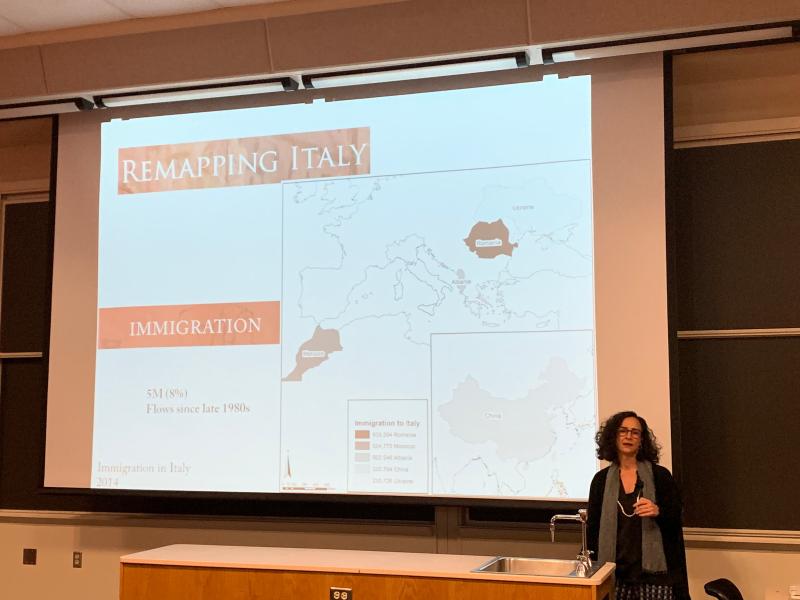(Im)mobility and Pre-Occupied Spaces: Teresa Fiore’s Residency at OSU

This past February, Prof. Teresa Fiore of Montclair State University engaged OSU students, staff, and faculty as MMI’s first scholar in residence. We invited Prof. Fiore for a series of events based on her work on Italian migrations, which bridges multiple national, cultural, and historical contexts. Fiore’s residency included class visits, a public lecture, workshops, an interview, and a final event with the local Italian community.
At her public lecture, Fiore presented several of the key themes and cases she discusses in her recently published book Pre-Occupied Spaces: Remapping Italy’s Transnational Migrations and Colonial Legacies. She focused in particular on the “space” of water as a site where multiple stories of mobility and immobility offer critical understandings of border crossing and resonances across historical periods and regions. The lecture was extremely well attended, and was followed by critical responses by Prof. Dana Renga and Prof. Dorothy Noyes. The following day, at the workshop with the Migration Studies Working Group, Fiore used the film The Orchestra of Piazza Vittorio as a starting point for discussion of transnational cities and cultural production. The nature of this smaller workshop provided the opportunity for a different kind of engagement, one more dialogical and in-depth.

The visit consisted of several events and commitments, including a meeting with members of the Italian American community of Columbus. The informal meeting was generously hosted at the St. John the Baptist church, in the historic Italian Village: Prof. Fiore met people of Italian origins of different ages, both first generation who still speak Italian (and sometimes local dialects!) and descendents of Italians who arrived in the U.S. as early as in the 19th century, discussing a wide arrange of topics, including controversial ones like the change on politics regarding Columbus Day. The small but energetic community still gathers every week in the marvelous church, which had recently been renewed, and that Prof. Fiore was able to visit thanks with the parishioners and their priest.
Students, undergraduates and graduates alike, were also involved in this important visit. Not only did several of them participate in the public lecture, asking questions and remaining at the end of the talk to speak with the speaker and the organizers, but Prof. Fiore was also able to visit two classes. Lamerica (dir. Gianni Amelio, 1994), an Italian film set in Albania, was the topic of Luca Peretti’s graduate class on Transnational Italian Cinema; in Prof. Sellman’s class on modern Arabic literature in translation, students compared Arabic literary narratives of migration to representations of Mediterranean migration in Italian documentaries and news media.
In addition to a residency grant from MMI, Fiore’s visit was supported by the Department of French and Italian; the Department of Comparative Studies; the Department of Near Eastern Languages and Cultures; the Center for Languages, Literatures, and Cultures; the Migration Studies Working Group; and the Global Mediterranean Working Group. Members from all these groups and departments participated in the visit, from attending seminars and talks to enjoying lunches and dinners with Prof. Fiore. This kind of interdepartmental support echoes both the importance and interdisciplinary nature of this kind of scholarship, and we look forward to future such events.
- Eleanor Paynter, Luca Peretti, Johanna Sellman
